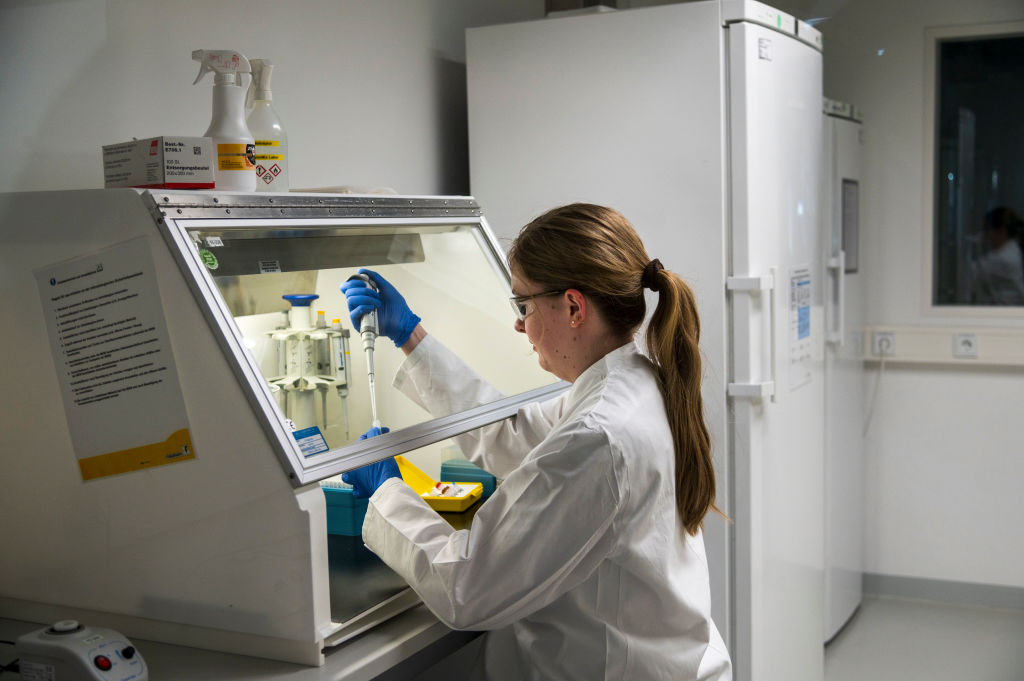Over the past few weeks there has been widespread curiosity about the German healthcare system. Since the coronavirus outbreak, the infection curve in Germany has risen just as steeply as in Italy, and the measures it has imposed are quite similar to those elsewhere. Yet, its death rate is noticeably lower. Of 100,132 Germans who have tested positive, only 1,584 have died, as of this morning. Compared to fatality rates above 6 per cent in neighbouring France, Netherlands or Belgium, that seems remarkable.
The most important reason for Germany’s rate is intense testing, using the South Korean model where widespread testing and isolation helped flatten the curve of new infections. The President of the Robert Koch Institute (RKI) – Germany’s public body in charge of the country’s response to infectious diseases – said on 20 March that domestic laboratories were able to conduct as many as 160,000 tests per week. To put that number in comparison, Britain was able to carry out roughly between 10,000 tests per day in mid-March.
Germany did not reach its ceiling back then. The RKI now believes that its laboratories can produce up to 500,000 tests per week. According to a strategy paper by the German government, their goal is now 200,000 tests per day. How has Germany managed to test so many compared to others in Europe?
First of all, it had a head-start. Already, on 16 January, before the World Health Organization (WHO) concluded that the novel coronavirus could be transmitted from one human to another, German scientists had created a test that proved to be one of the first reliable means of detecting the virus. That test was then rapidly produced and adopted by the WHO.
Since February, between 200 and 300 German laboratories have become involved in the rapid testing scheme. It is said that these institutes are among the fastest and most efficient in the world. While governments across the world are still trying to boost their ability to perform large numbers of tests, Germany had already developed a high-intensity testing scheme. And there is no end in sight. Bosch, the global technology company from Stuttgart, has assigned its medical engineers to develop a new diagnostic test that will be able to detect coronavirus in 2.5 hours.
Second, the country was meticulously prepared for a pandemic. Once it became clear that the spread of the virus was serious, a reporting system involving the Robert Koch Institute and all public health offices came into play. Plus, a detailed ‘epidemic strategy’ lying in the drawer for years outlined payment structures for laboratories for diagnostic tests. There were no questions, nor any disputes, about costs and accounting.
When the RKI signalled that it was necessary, testing began nationwide and not just regionally as in Italy, where only those in the north were tested early on. The RKI is not the sole testing authority in Germany, it only makes recommendations. 16 federal states make their own decisions on coronavirus testing because each of them is responsible for their own healthcare systems. The benefit is that regional authorities have a more accurate read of confirmed infection cases.
Talking to senior officials in Berlin, they emphasise that the healthcare system here works like a well-oiled machine, without centralised hierarchies and endless coordination meetings. Local institutions knew what they had to do to get the testing scheme going. A major advantage of the country’s healthcare sector is that doctor’s practices and hospitals are spread out. That allowed setting up an impressive number of test centres.
Third, the country’s health insurance system, the oldest of its kind in the world, makes sure that patients have unrestricted access to treatment, and medical facilities are funded sufficiently. The system is split into private and public health insurance, with 85 per cent covered by the latter. In 2009, health insurance was made mandatory for all citizens, while private insurance companies are obliged to accept any applicant on at least a basic programme with capped premiums. About three quarters of the system is government-funded.
As impressive as of all of this is, healthcare in Germany is not flawless by any means. There have still been reported cases where people with symptoms had to wait awfully long to get tested for Covid-19 or were rejected at first. But as the pressure on German healthcare institutions is mounting, they continue to work smoothly and with enough resources to diagnose and treat more patients than almost any other country. After all, the current pandemic is the ultimate stress tests for national healthcare systems around the world.






Comments